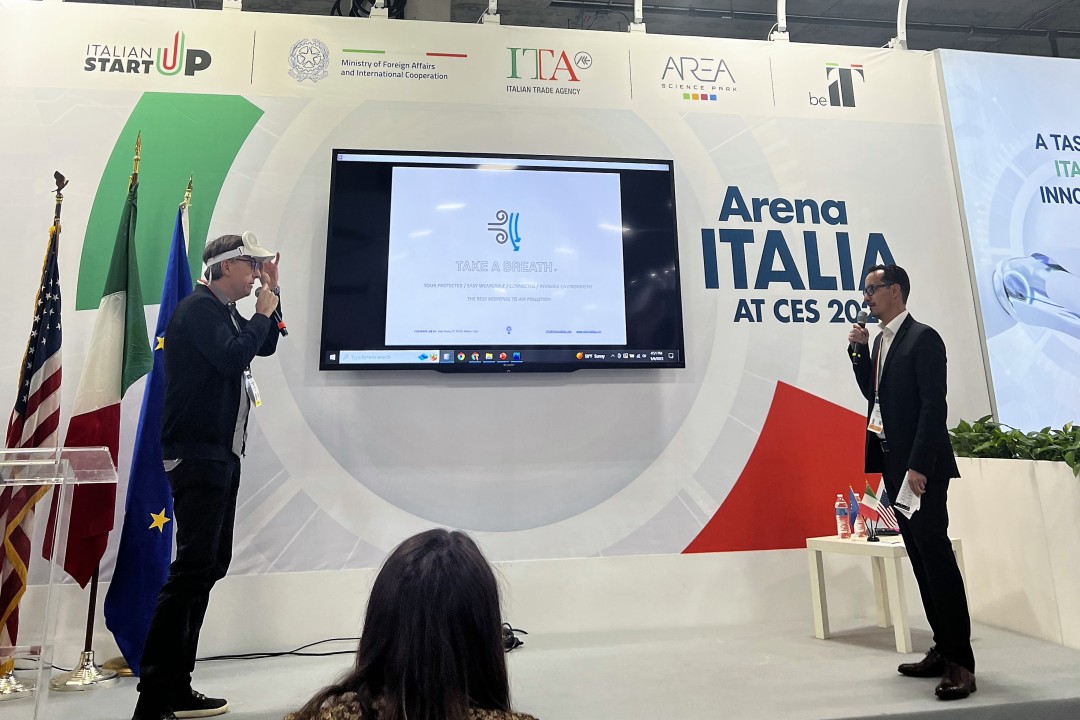An invisible protection mask from Italy draws attention at CES
A startup from Tuscany shows a prototype of a wearable air purifier which creates an invisible barrier to pollutants and germs. It can hit the market within 12 months, says one of the founders of the company
This year’s CES in Las Vegas featured 50 startups from Italy, one of which came from Tuscany. VisionairLab, founded in 2020 in Massa, a small town in the northern tip of Tuscany, follows the hot trend of conceiving health-related devices. “Take a breath”, this is how is called the device from VisionairLab, is a sort of air mask that moves pollutants and viruses away from the face, using a combination of an invisible visor and a purified air respirator.
Invisible barrier
The device is worn like a hat and does not restrict visibility, as there is nothing in front of the face but an invisible air barrier. No wonder the novelty attracted a lot of interest at CES, as Michele Boni, founder of Visionair Lab, confirms speaking with InnovationOpenLab. “I must admit we were surprised by the wide interest we received at CES. Our aim was to look for investors to establish alliances in order to produce the device, and we got some promising talks”, says Boni, explaining that “production could be achieved in less than a year, with some simple fine-tuning to the current prototypes and an investment around Euro 600,000”.
 Michele Boni of Visionair Lab (left) showing "Take a Breath" at CES Italian Pavilion
Michele Boni of Visionair Lab (left) showing "Take a Breath" at CES Italian Pavilion
Many use cases
Take a Breath uses the technology “Twin Flow System”, i.e. everything works through two streams, one that creates a dynamic barrier in front of the face and the other that pushes air towards the wearer of the visor. The air is cleaned through interchangeable filters. This way, the wearer has no “physical” barriers, such as fabric or plastic, and the interaction is quite natural. “When showing our prototypes at CES, we have also received some new ideas for possible uses, such as for people allergic to pollen or for those who work in environments with a lot of dust”, adds Boni. The device delivers four levels of protection depending on the use: indoors, outdoors, sporting activity, and max level. In average conditions, an autonomy of over two hours per battery pack is expected.
Level 7 of TRL
The device was first conceived during the pandemic, in 2020. “With everyone forced to wear a mask to avoid Covid, we thought we might create something more practical. Over these two years, going through from the design to the realization of some prototypes, we have reached the stage 7 on the TRL, Technology Readiness Level. As you know, on a scale of 1 to 9, level 7 indicates the existence of a sytem prototype in an operational environment”, concludes Michele Boni.

Edoardo Bellocchi
His first contacts with tech and IT date back to the era of the never forgotten Commodore 64. After some 15 years as a tech user and sometimes enthusiast, he went on to pursue a career in the IT field, first as a journalist and then as a PR. In recent years, he prefers to be identified as a journalist covering the wider technology market, with an eye to innovation topics.
Related news
Last News
RSA at Cybertech Europe 2024
Alaa Abdul Nabi, Vice President, Sales International at RSA presents the innovations the vendor brings to Cybertech as part of a passwordless vision for…
Italian Security Awards 2024: G11 Media honours the best of Italian cybersecurity
G11 Media's SecurityOpenLab magazine rewards excellence in cybersecurity: the best vendors based on user votes
How Austria is making its AI ecosystem grow
Always keeping an European perspective, Austria has developed a thriving AI ecosystem that now can attract talents and companies from other countries
Sparkle and Telsy test Quantum Key Distribution in practice
Successfully completing a Proof of Concept implementation in Athens, the two Italian companies prove that QKD can be easily implemented also in pre-existing…
Most read
Management Controls, Inc. Wins Prestigious 2025 CIO 100 Award for AI Innovation…
Management Controls, Inc. (MCi), the leader in contractor data management solutions for heavy industrial companies, today announced it has been named…
Altera Starts Production Shipments of Industry’s Highest Memory Bandwidth…
Altera Corporation, a leader in FPGA innovations, today announced production shipments of its Agilex™ 7 FPGA M-Series, the industry's first high-end,…
Kinaxis Partners With Databricks to Accelerate AI-Powered Supply Chain…
Kinaxis® (TSX:KXS), a global leader in end-to-end supply chain orchestration, and Databricks, the data and AI company, today announced a partnership to…
Source Photonics Showcases Industry’s First-Ever 200G/Lane Multi-Channel…
Source Photonics Inc., a leading global provider of innovative and reliable technology solutions for communications and data connectivity for use in hyperscale…






